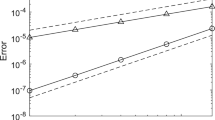Abstract
The aim of this paper is to present and study new linearized conservative schemes with finite element approximations for the Nernst–Planck–Poisson equations. For the linearized backward Euler FEM, an optimal \(L^2\) error estimate is provided almost unconditionally (i.e., when the mesh size h and time step \(\tau \) are less than a small constant). Global mass conservation and electric energy decay of the schemes are also proved. Extension to second-order time discretizations is given. Numerical results in both two- and three-dimensional spaces are provided to confirm our theoretical analysis and show the optimal convergence, unconditional stability, global mass conservation and electric energy decay properties of the proposed schemes.







Similar content being viewed by others
References
Logg, A., Mardal, K.-A., Wells, G.N. (eds.): Automated Solution of Differential Equations by the Finite Element Method. Springer, Berlin (2012). doi:10.1007/978-3-642-23099-8
Bochev, P., Lehoucq, R.: On the finite element solution of the pure Neumann problem. SIAM Rev. 47, 50–66 (2005)
Brenner, S., Scott, L.: The Mathematical Theory of Finite Element Methods. Springer, New York (2002)
Brezzi, F., Marini, L., Pietra, P.: Two-dimensional exponential fitting and applications to drift-diffusion models. SIAM J. Numer. Anal. 26, 1342–1355 (1989)
Brezzi, F., Marini, L., Pietra, P.: Numerical simulation of semiconductor devices. Comput. Methods Appl. Mech. Eng. 75, 493–514 (1989)
Brunk, M., Kværnø, A.: Positivity preserving discretization of time dependent semiconductor drift-diffusion equations. Appl. Numer. Math. 62, 1289–1301 (2012)
Chen, Y., Wu, L.: Second-order Elliptic Equations and Elliptic Systems, Translations of Mathematical Monographs 174, AMS (1998)
Evans, L.: Partial Differential Equations, Graduate Studies in Mathematics 19. American Mathematical Society, Providence, RI (1998)
Flavell, A., Machen, M., Eisenberg, R., Kabre, J., Liu, C., Li, X.: A conservative finite difference scheme for Poisson–Nernst–Planck equations. J. Comput. Electron. 15, 1–15 (2013)
Gajewski, H., Gröger, K.: On the basic equations for carrier transport in semiconductors. J. Math. Anal. Appl. 113, 12–35 (1986)
He, D., Pan, K.: An energy preserving finite difference scheme for the Poisson–Nernst–Planck system. Appl. Math. Comput. 287–288, 214–223 (2016)
Heywood, J., Rannacher, R.: Finite element approximation of the nonstationary Navier–Stokes problem IV: error analysis for second-order time discretization. SIAM J. Numer. Anal. 27, 353–384 (1990)
Hou, Y., Li, B., Sun, W.: Error analysis of splitting Galerkin methods for heat and sweat transport in textile materials. SIAM J. Numer. Anal. 51, 88–111 (2013)
Li, B., Lu, B., Wang, Z., McCammon, J.A.: Solutions to a reduced Poisson–Nernst–Planck system and determination of reaction rates. Phys. A 389, 1329–1345 (2010)
Liu, Y., Shu, C.W.: Analysis of the local discontinuous Galerkin method for the drift-diffusion model of semiconductor devices. Sci. China Math. 59, 115–140 (2016)
Liu, H., Wang, Z.: A free energy satisfying finite difference method for Poisson–Nernst–Planck equations. J. Comput. Phys. 268, 363–376 (2014)
Lu, B., Holst, M., McCammon, J., Zhou, Y.: Poisson-Nernst-Planck equations for simulating biomolecular diffusion-reaction processes I: finite element solutions. J. Comput. Phys. 229, 6979–6994 (2010)
Metti, M., Xu, J., Liu, C.: Energetically stable discretizations for charge transport and electrokinetic models. J. Comput. Phys. 306, 1–18 (2016)
Mirzadeh, M., Gibou, F.: A conservative discretization of the Poisson–Nernst–Planck equations on adaptive Cartesian grids. J. Comput. Phys. 274, 633–653 (2014)
Mock, M.: An initial value problem from semiconductor device theory. SIAM J. Math. Anal. 5, 597–612 (1974)
Nirenberg, L.: An extended interpolation inequality. Ann. Scuola Norm. Sup. Pisa (3) 20, 733–737 (1966)
Prohl, A., Schmuck, M.: Convergent discretizations for the Nernst–Planck–Poisson system. Numer. Math. 111, 591–630 (2009)
Prohl, A., Schmuck, M.: Convergent finite element for discretizations of the Navier–Stokes–Nernst–Planck–Poisson system. M2AN Math. Model. Numer. Anal. 44, 531–571 (2010)
Rannacher, R., Scott, R.: Some optimal error estimates for piecewise linear finite element approximations. Math. Comp. 38, 437–445 (1982)
Scharfetter, D., Gummel, H.: Large signal analysis of a silicon read diode oscillator. IEEE Trans. Electron. Dev. 16, 64–77 (1969)
Schmuck, M.: Analysis of the Navier–Stokes–Nernst–Planck–Poisson system. Math. Models Methods Appl. Sci. 19, 993–1015 (2009)
Sun, Y., Sun, P., Zheng, B., Lin, G.: Error analysis of finite element method for Poisson–Nernst–Planck equations. J. Comput. Appl. Math. 301, 28–43 (2016)
Sun, W., Sun, Z.: Finite difference methods for a nonlinear and strongly coupled heat and moisture transport system in textile materials. Numer. Math. 120, 153–187 (2012)
Thomee, V.: Galerkin Finite Element Methods for Parabolic Problems. Springer, Berlin (2006)
Wei, G., Zheng, Q., Chen, Z., Xia, K.: Variational multiscale models for charge transport. SIAM Rev. 54, 699–754 (2012)
Xu, S., Chen, M., Majd, S., Yue, X., Liu, C.: Modeling and simulating asymmetrical conductance changes in Gramicidin pores. Mol. Based Math. Biol. 2, 509–523 (2014)
Acknowledgements
Huadong Gao was supported in part by a grant from the National Natural Science Foundation of China (NSFC) under Grant No. 11501227. Dongdong He was supported in part by a Grant from the National Natural Science Foundation of China (NSFC) under Grant No. 11402174. The authors would like to thank Dr. Weifeng Qiu for useful suggestions.
Author information
Authors and Affiliations
Corresponding author
Rights and permissions
About this article
Cite this article
Gao, H., He, D. Linearized Conservative Finite Element Methods for the Nernst–Planck–Poisson Equations. J Sci Comput 72, 1269–1289 (2017). https://doi.org/10.1007/s10915-017-0400-4
Received:
Revised:
Accepted:
Published:
Issue Date:
DOI: https://doi.org/10.1007/s10915-017-0400-4
Keywords
- Nernst–Planck–Poisson equations
- Finite element methods
- Unconditional convergence
- Optimal error estimate
- Conservative schemes



